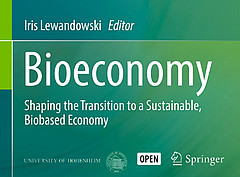From lecturers and students: In times of climate change, resource scarcity, and the need for food security, bioeconomy looks at new methods to gain control of these global problems. Bioeconomy relies on plants, animals, microorganisms, and new procedures to produce food, animal fodder, raw materials, and energy. A new book from the University of Hohenheim in Stuttgart edited by Prof. Dr. Iris Lewandowski shows not only the opportunities and advantages of bioeconomy. It also explains how experts from various disciplines work together – and how bioeconomy works best in interdisciplinary teaching. Textbook from University of Hohenheim for best practices in bioeconomy education | more press photos in print quality

The University of Hohenheim’s Master’s program in Bioeconomy is unique in Germany. During their studies, students deal with the challenges of the 21st century and learn how they can be confronted with the help of bioeconomy.
In their new book “Bioeconomy – Shaping the Transition to a Sustainable, Biobased Economy,” experts from agricultural, natural, business, economic, and social sciences at the University of Hohenheim describe the problems of the petroleum economy. At the same time, they offer ideas for finding solutions and explain where there is need for more research.
“Besides the experts, four Master’s students in Bioeconomy at the University of Hohenheim have contributed to the book. They give insights into how teaching can be improved in this area,” says the expert. “With this, we also aimed to provide guidelines for the education of future generations.”
Bioeconomy: Economic and Interdisciplinary
To secure our future, one simply has to look for alternatives to petroleum, is the experts’ tone in the new book. Bioeconomy offers such an alternative.
“A sustainable bioeconomy provides this kind of alternative, and that is why we describe the possibilities for development in our book,” states Prof. Dr. Lewandowski. “Besides that, we show how bioeconomy can be successfully implemented economically and how interdisciplinary our research is.”
The entire spectrum of bioeconomy can be seen in the book – the basics of producing biomass are presented as well as possibilities for processing or marketing. “We show that bioeconomy truly offers a sustainable alternative to the oil economy,” says Jan Lask, the book’s student editor.
A Guide for Educating Bioeconomy Experts
In addition to these possibilities, the textbook also provides guidelines for improving education in this area. “For these new fields, we need experts who think systematically, who can work in an interdisciplinary way along the biobased product chain, and who are familiar with the methods of producing, processing, and marketing.”
When doing so, the experts also look to the future of their students. “We want to make clear what professional opportunities there are in bioeconomy. The book shows what competences future bioeconomists should have.” To do justice to the students’ demands, the textbook’s concept was developed by students. “We hope that we can help make this broad topic understandable to future students of bioeconomy,” says Jan Lask.
The 355-page textbook “Bioeconomy – Shaping the Transition to a Sustainable, Biobased Economy” is available as a free open source file or can be purchased from the Springer Verlag in hardcover for 53.49 €.
Contact
Prof. Dr. Iris Lewandowski
Universität Hohenheim
Institut für Kulturpflanzenwissenschaften
T +49 711 459 22221
E Iris_Lewandowski@uni-hohenheim.de
Author
C. Schmid / Klebs
Source
University of Hohenheim, press release, 2018-03-12.
Supplier
Share
Renewable Carbon News – Daily Newsletter
Subscribe to our daily email newsletter – the world's leading newsletter on renewable materials and chemicals









